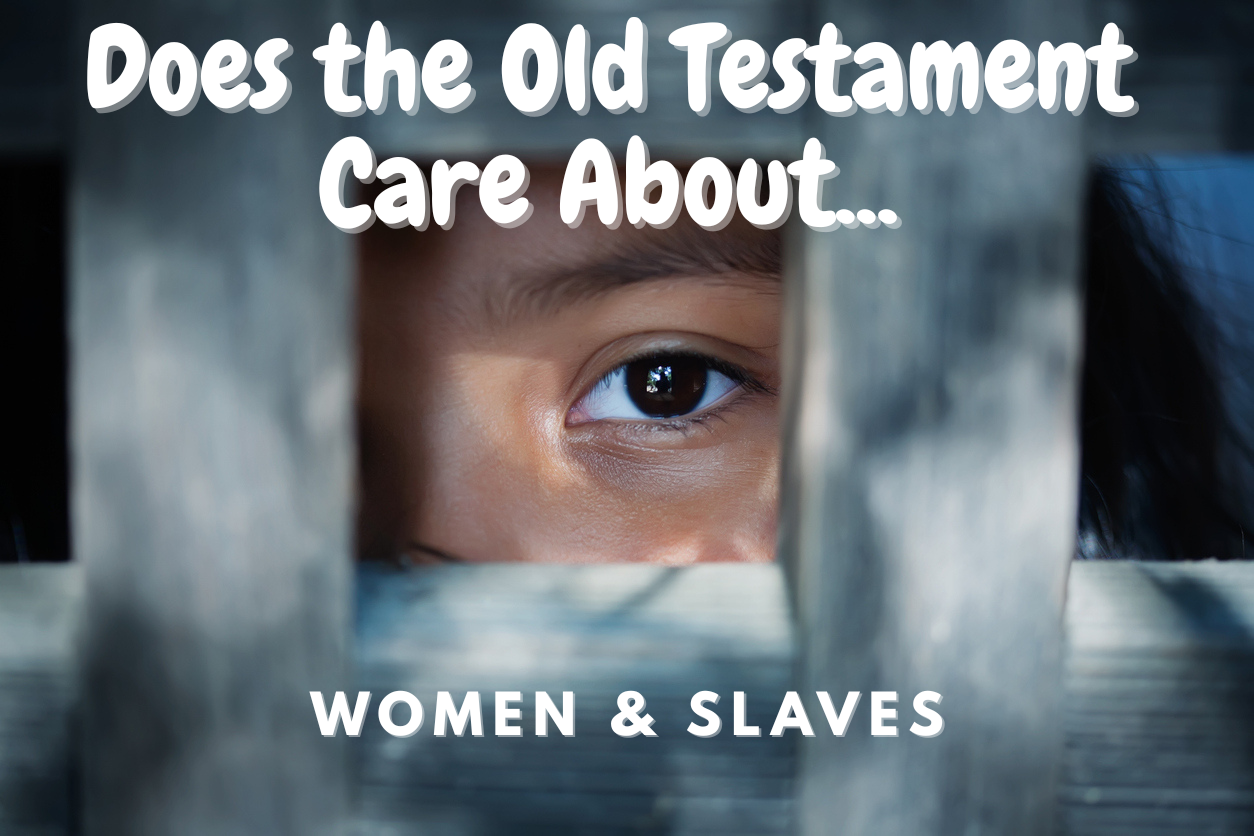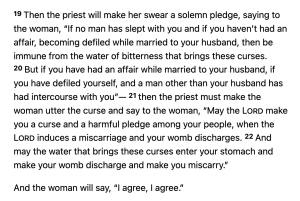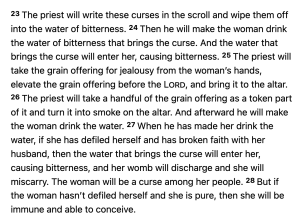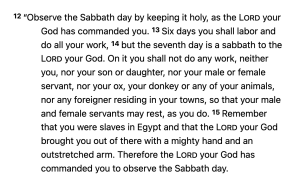
10 Nov Did God Care about OT Women?
The laws in the Old Testament in regard to slavery and women seem to us to be unfair, and the appear to paint God as uncaring, but nothing could be further from the truth.
Rather these laws display the intelligence of God in staging change through time, where change could not be brought about instantly. It’s hard to understand without examples.
Example One: The Woman Accused of Adultery (Numbers 5:11–31)
A woman is accused/suspected by her husband of being unfaithful, but there is no proof of it. If she is actually caught being adulterous they would kill her, but he has no proof, but rather suspects it. The law requires her to take an oath that she has been faithful, and take a curse if she is lying.

After she takes the oath, the priest then makes a potion she must drink.

This whole prescription of what to do sounds VERY much like it is against the woman and women in general. But nothing could be further from the truth. The background context is revealing.
Ancient society was very patriarchal, and women were considered property. Previous to this law above, a husband didn’t need proof that his wife was unfaithful. He could simply kill her, or divorce her without any recourse. That meant the woman was without support in a world where no other man would show any interest in her. Either way, whether she died by her husband’s hand or lived without support, both were bad options.
And husbands who were not good men, were inclined to get rid of wives they had become tired of, even if that wife had been faithful and good. Given how terrible the consequences were for adultery, it was VERY unlikely that any women would risk being adulterous. There was no contraception and being adulterous risked death, or ruining one’s entire future.
This law was a HUGE step forward for women’s rights. Now a man in Israel could not kill his wife if he felt like it, and if he accused her of adultery and there was no proof (because she probably wasn’t adulterous) she now has to drink a potion. If her abdomen rots out, she was unfaithful but it if didn’t, she was faithful and he could not get rid of her.
What is the chance of her abdomen rotting out?
God is a genius. He is introducing change into a world in a step-by-step way that would bring permanent change to the status of women, so that they too can be protected and cared for. This law in Israel was a huge improvement to the security and status of women, and a check against men who could no longer just do what they wanted.
All the way through the Bible the status of women is elevated bit by bit. We see Jesus with female disciples, and even appeared in his resurrection to women first. In the NT there are women who are leaders of churches and on it goes.
To my way of understanding it, women have the freedoms they have in the world today because of the Bible and the Gospel. If we removed those influences from history, would the world still have the progress it has had? And there are of course some parts of the world that have not had the same level of Biblical influence and worldview. How do the rights of women compare in those parts of the world?
Example Two: A Sabbath for Slaves – The Ten Commandments
This particular law comes right out of the ten commandments. Here we have the fourth law for keeping of the sabbath.

In the ancient world, slavery was ubiquitous, it was everywhere. And slaves did not have a break, and no rights at all. But in the Bible, we find that when God commands a day of rest for his people, the slaves are also to have a day off.
That is unique in the ancient world. I can assure you that people did not come up with that idea, it came from the heart of God.
As the Bible advances (just as with women) there is a process of slavery being undermined steadily. It is the Bible which teaches us that all people are made in God’s image (slaves included), but nowhere else in ancient through does this idea exist.
God is taking steps one at a time to bring about lasting change. To instantly change things would have failed because the values of people would not have changed and it would revert back.
Example Three: The Rebellious Son (Deuteronomy 21:18–21)

It sounds so brutal. How could God allow anyone to stone their child to death? How could God be like that?
The reality is that any parent could at any point kill their child without any recourse. People in fact did kill their children, even offering them as sacrifices to various gods in the ancient world. What we have here is a law that says, a parent cannot simply kill a child, but must bring him to a legal tribunal and receive a ruling.
God is introducing a third party which stops people taking extra-judicial action whenever they felt like it. Now people are responsible for their actions. This is a huge step forward in the protection of rights of children, and interestingly, there is no example in the Bible or elsewhere in Israel of any child being stoned by their parents because of this law. So it had the desired effect of saving lives.
In Summary:
God has worked over time to change what humanity values, and change how it thinks. This is a process, but the result is that even non-believers in God place value on human life today, but it was never like that in Biblical times.
The process of changing values had to start way back when values were very different. Those initial laws sound brutal because the times in which they were written were much more brutal and the law was moderating them.
I’m always amazed at how much God cares, and how far we have come because of the Bible.



No Comments